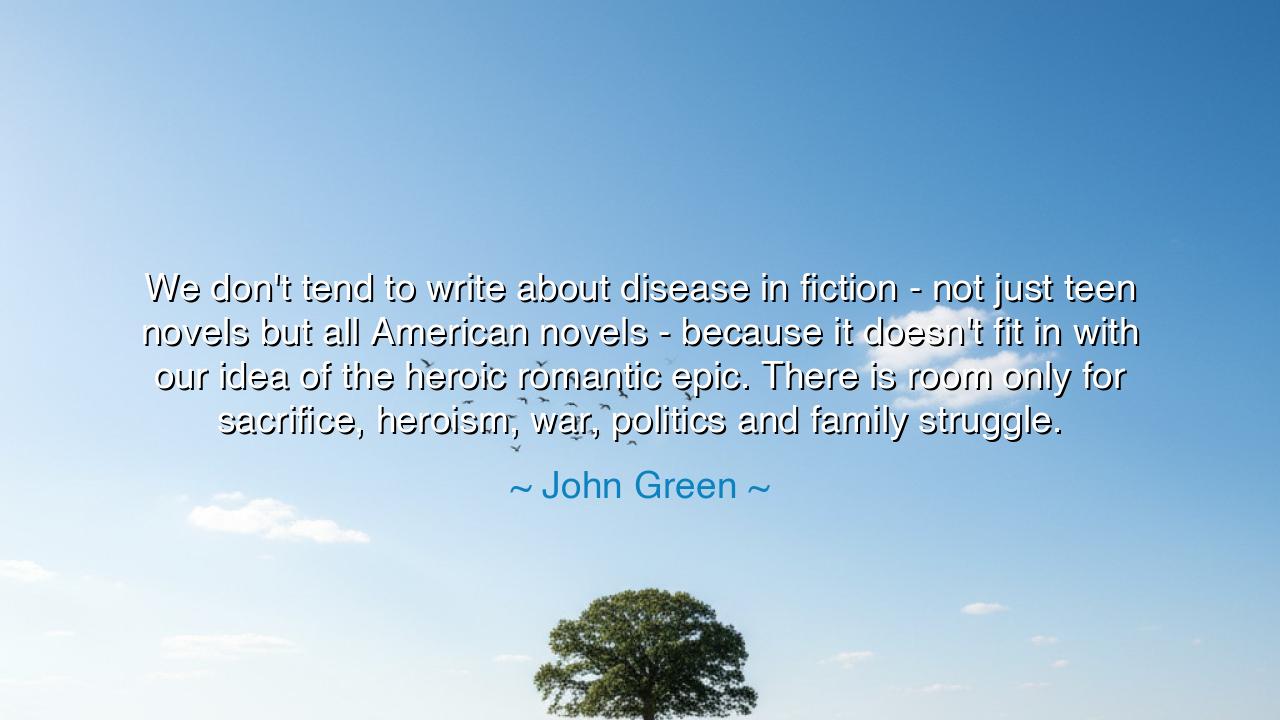
We don't tend to write about disease in fiction - not just teen
We don't tend to write about disease in fiction - not just teen novels but all American novels - because it doesn't fit in with our idea of the heroic romantic epic. There is room only for sacrifice, heroism, war, politics and family struggle.






"We don't tend to write about disease in fiction - not just teen novels but all American novels - because it doesn't fit in with our idea of the heroic romantic epic. There is room only for sacrifice, heroism, war, politics, and family struggle." These words by John Green offer a profound critique of the way we, as a society, view narratives of heroism and struggle. Green suggests that our conception of the heroic epic, ingrained in our culture, tends to leave out the more silent struggles of life—those that occur behind closed doors and inside the human body. Disease, in this sense, becomes a forgotten battle, not because it lacks drama or heroism, but because it does not fit neatly into the glorified version of human experience that our narratives traditionally promote.
In the ancient world, the concept of heroism was largely defined by the physical and military achievements of great men. In Homer’s Iliad, heroes like Achilles and Hector were defined by their ability to fight and conquer on the battlefield. The greatest sacrifices were those made in war—the loss of one’s life for a greater cause, a cause that was always outwardly visible, often involving the defense of family, country, or honor. The ancients glorified war and its heroes because it fit within their larger narrative of courage, valor, and mortal struggle. Disease, on the other hand, was invisible. It did not provide the glorious death on the battlefield or the dramatic stories of sacrifice that the people of those times could easily rally behind.
Much like the ancient world, our modern heroic epics—whether in literature, film, or media—tend to glorify the visible struggles. We celebrate war, politics, and family battles because these are the external struggles that have always defined what it means to be a hero in our culture. American novels, for example, often focus on individuals overcoming external forces—be it the great depression, the civil war, or political upheaval. The great heroes of our stories tend to be the brave soldiers, the revolutionaries, and the leaders who sacrifice for their nation or their families. Yet, as Green points out, the internal struggle—the battle with disease, with the frailty of the body, does not fit into these narratives. Disease, in its quiet grip on the body, lacks the romanticism that we typically associate with heroism.
Consider the story of Alexander the Great, who, despite his overwhelming military conquests, died young from what was believed to be malaria or typhoid fever. His death, caused not by a heroic battle but by an unseen, invisible illness, struck a blow to the narrative of the invincible conqueror. The ancient world struggled to reconcile this great hero, whose empire spanned continents, with the unceremonious way in which his life ended. This is the tension that Green touches upon—disease does not lend itself easily to the epic struggle that we so often glorify in our stories. It is silent, private, and relentless, taking away from the individual’s public legacy and leaving only the quiet suffering behind the scenes.
Green’s quote challenges us to reconsider what we define as heroic and romantic. Disease, while not visible in the way war or family strife is, can be just as transformative, triumphant, and sacrificial. The strength to endure long-term illness or the courage to face the uncertainty of a chronic disease requires a type of heroism that is often overlooked. In the modern world, we may not have the physical battles of the ancient heroes, but we still have battles of the spirit. Consider Frida Kahlo, who battled polio as a child and later lived with the chronic pain from a bus accident. Despite her physical suffering, Kahlo’s art became a symbol of personal resilience and emotional truth. Her life, though marked by illness, became a testament to the heroic endurance of the human spirit. This is the kind of heroism Green points to: the quiet strength of those who fight unseen battles, yet still leave behind a legacy of great courage.
The lesson here is profound: true heroism is not always visible, nor does it always fit neatly into our traditional narratives of sacrifice and victory. Disease, though it does not offer the flash and glory of war or politics, can still be a ground for greatness. In fact, the true test of humanity may lie in the quiet endurance of those who face their own physical battles. It is in the bravery of enduring long-term suffering or illness that we may find the most profound heroism, a kind of strength that comes not from outward action but from internal fortitude.
Let us then learn to see heroism in all its forms. Let us not define greatness by the external struggle, but by the internal battle—the daily effort to rise above pain, doubt, and fear. The silent warriors—those who fight battles with disease, mental illness, or adversity—are the true heroes in our midst. As Green suggests, we must open our narratives to embrace the invisible, the unsung, and the quiet forms of heroism, recognizing that strength is not always defined by the battles fought in the open, but by the quiet perseverance that takes place when no one is watching.






AAdministratorAdministrator
Welcome, honored guests. Please leave a comment, we will respond soon